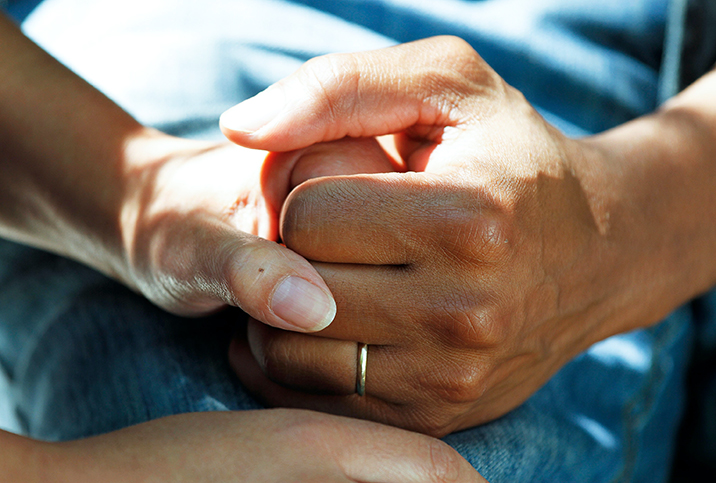Little Known Symptoms of Prostate Cancer

Prostate cancer is one of the most common forms of the disease to strike men, particularly those older than 50, and is second behind only skin cancer as the most common one to hit American men.
With nearly 250,000 new cases diagnosed annually, it's no surprise that public service announcements and recommendations from medical organizations warn men to get a jump on screening, especially considering prostate cancer is often notoriously symptom-free in its early stages.
There are some subtle signals outside the exam room that your body may send if you're developing prostate cancer. Here are a few of the lesser-known signals. Keep in mind these are more often symptoms of conditions much less dire than prostate cancer. Don't ignore them, but don't assume the worst, either. Sometimes diarrhea is just diarrhea, and often blood in your semen is just the result of an easily treatable prostate inflammation.
Soreness in the groin
While soreness in the groin can be related to a number of harmless causes, such as your latest workout, chronic soreness can potentially be a symptom of prostate cancer. When any type of cancer spreads, one of its common strategies is to attack nearby lymph nodes and then spread to other parts of the body via the lymphatic system, which is a network of glands that your body uses to regulate fluids and fight infection.
Since your groin area is home to many lymph nodes, men with undiagnosed prostate cancer may notice soreness, swelling or pain in the area as cancer prevents the glands from draining fluid normally, a condition also known as lymphedema. Don't assume the worst—morning soreness could be the result of sleeping in an odd position, for example—but do see your doctor if the pain persists.
Bowel problems
Since the prostate gland sits just in front of the rectum inside your body, cancer that has enlarged your prostate or spread to nearby areas can cause intestinal problems. Men with more advanced prostate cancer may experience constipation, stomach pain, diarrhea, blood in their stool or even a loss of bowel control. But intestinal and bowel troubles are also tied to any number of other issues—including your latest meal. Everyone experiences diarrhea or constipation sometimes, but if you find that your chronic gut troubles don't respond to over-the-counter meds or a change in diet, head to your doctor. They can order tests to get to the bottom of your bottom-related troubles.
Swelling in the legs or feet
Swollen legs and feet can be caused by any number of conditions, including diabetes, deep vein thrombosis, lymphedema, and even sitting or standing for too long or wearing tight-fitting pants. Yes, it can also be a sign that prostate cancer has spread due to the buildup of lymphatic fluid. If you haven't gained weight in the rest of your body, and this swelling is accompanied by urinary issues or new bouts of erectile dysfunction (ED), it may be an indication of prostate cancer. But first things first: Rule out the more common factors of swelling before you jump into panic mode.
Blood in the urine
A common signal of prostate issues, including prostate cancer, is urinary trouble. Two of the most common urinary problems are frequent urination and getting up multiple times at night to pee.
However, a lesser-known symptom of prostate cancer is blood in the urine or hematuria. According to Johns Hopkins Medicine, blood in the urine can also indicate issues such as a urinary tract infection (UTI) or kidney problems. Either way, if your urine looks pinkish, red or tea-colored, see a doctor. A urologist will look at blood in the urine to determine whether it points to cancer or one of the more common ailments, such as a UTI, kidney stones or stricture. Sounds simple, but if a patient has risk factors for cancer, such as smoking or a family history of cancer, they will need further tests, including bladder exams or imaging.
Numbness in the lower extremities
Hip, thigh, bone and back pain—typically severe—are all common symptoms of advanced prostate cancer as it moves into the bones. However, a little-known related symptom is numbness or tingling in the legs and feet as the cancer presses on the nerves in the spine and lower back. Many other conditions can cause such tingling, though. Numbness is also a side effect of more common ailments such as sciatica—or nerve pain stemming from the sciatic nerve in the spine—and diabetic neuropathy. Do yourself (and your blood pressure) a favor and don't make the jump from tingling to cancer before consulting your doctor.
Unexplained weight loss
As with most other forms of cancer, prostate cancer can lead to unexplained weight loss, but it is usually in tandem with one or more of the symptoms discussed above. Another related sign may be a loss of appetite or diminished interest in food as the disease spreads to other parts of the body. Again, loss of appetite can point to less serious issues.
Fatigue
In this day and age, fatigue is a common complaint due to overwork, stress, sleep issues and other factors. However, unexplained or new feelings of fatigue are common in the early and later stages of prostate cancer. Of course, anemia, an underactive thyroid, sleep apnea and other conditions can cause fatigue.
Blood in your semen
As cancer in the prostate grows, it can cause irritation and inflammation, which may lead to the appearance of blood in your semen. There are other possible reasons you might see blood in your ejaculate, such as prostatitis (noncancerous inflammation of the prostate), but mention it to your doctor in any case.
Despite advances in treatment options, prostate cancer remains a serious threat to men. If you're older than 50—or younger if you fall into higher-risk categories—talk with your doctor about setting up a regular screening schedule.
Being aware of all the early signs and symptoms of prostate cancer can help with early detection and treatment, key components of a favorable prognosis.


















